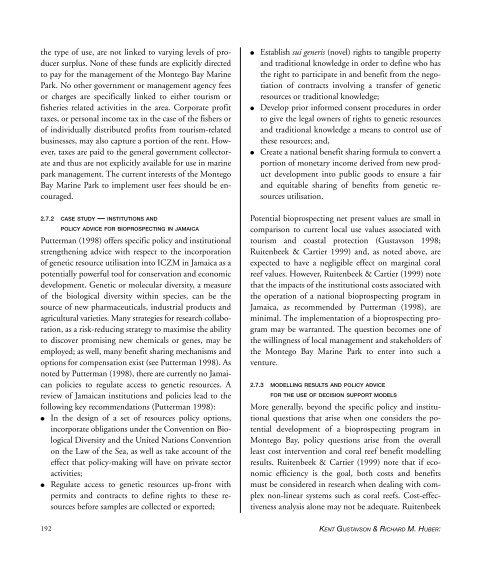Create successful ePaper yourself
Turn your PDF publications into a flip-book with our unique Google optimized e-Paper software.
the type <strong>of</strong> use, are not linked to varying levels <strong>of</strong> producer<br />
surplus. None <strong>of</strong> these funds are explicitly directed<br />
to pay for the management <strong>of</strong> the Montego Bay Marine<br />
Park. No other government or management agency fees<br />
or charges are specifically linked to either tourism or<br />
fisheries related activities in the area. Corporate pr<strong>of</strong>it<br />
taxes, or personal income tax in the case <strong>of</strong> the fishers or<br />
<strong>of</strong> individually distributed pr<strong>of</strong>its from tourism-related<br />
businesses, may also capture a portion <strong>of</strong> the rent. However,<br />
taxes are paid to the general government collectorate<br />
and thus are not explicitly available for use in marine<br />
park management. The current interests <strong>of</strong> the Montego<br />
Bay Marine Park to implement user fees should be encouraged.<br />
●<br />
●<br />
●<br />
Establish sui generis (novel) rights to tangible property<br />
and traditional knowledge in order to define who has<br />
the right to participate in and benefit from the negotiation<br />
<strong>of</strong> contracts involving a transfer <strong>of</strong> genetic<br />
resources or traditional knowledge;<br />
Develop prior informed consent procedures in order<br />
to give the legal owners <strong>of</strong> rights to genetic resources<br />
and traditional knowledge a means to control use <strong>of</strong><br />
these resources; and,<br />
Create a national benefit sharing formula to convert a<br />
portion <strong>of</strong> monetary income derived from new product<br />
development into public goods to ensure a fair<br />
and equitable sharing <strong>of</strong> benefits from genetic resources<br />
utilisation.<br />
2.7.2 CASE STUDY — INSTITUTIONS AND<br />
POLICY ADVICE FOR BIOPROSPECTING IN JAMAICA<br />
Putterman (1998) <strong>of</strong>fers specific policy and institutional<br />
strengthening advice with respect to the incorporation<br />
<strong>of</strong> genetic resource utilisation into ICZM in Jamaica as a<br />
potentially powerful tool for conservation and economic<br />
development. Genetic or molecular diversity, a measure<br />
<strong>of</strong> the biological diversity within species, can be the<br />
source <strong>of</strong> new pharmaceuticals, industrial products and<br />
agricultural varieties. Many strategies for research collaboration,<br />
as a risk-reducing strategy to maximise the ability<br />
to discover promising new chemicals or genes, may be<br />
employed; as well, many benefit sharing mechanisms and<br />
options for compensation exist (see Putterman 1998). As<br />
noted by Putterman (1998), there are currently no Jamaican<br />
policies to regulate access to genetic resources. A<br />
review <strong>of</strong> Jamaican institutions and policies lead to the<br />
following key recommendations (Putterman 1998):<br />
● In the design <strong>of</strong> a set <strong>of</strong> resources policy options,<br />
incorporate obligations under the Convention on Biological<br />
Diversity and the United Nations Convention<br />
on the Law <strong>of</strong> the Sea, as well as take account <strong>of</strong> the<br />
effect that policy-making will have on private sector<br />
activities;<br />
● Regulate access to genetic resources up-front with<br />
permits and contracts to define rights to these resources<br />
before samples are collected or exported;<br />
Potential bioprospecting net present values are small in<br />
comparison to current local use values associated with<br />
tourism and coastal protection (Gustavson 1998;<br />
Ruitenbeek & Cartier 1999) and, as noted above, are<br />
expected to have a negligible effect on marginal coral<br />
reef values. However, Ruitenbeek & Cartier (1999) note<br />
that the impacts <strong>of</strong> the institutional costs associated with<br />
the operation <strong>of</strong> a national bioprospecting program in<br />
Jamaica, as recommended by Putterman (1998), are<br />
minimal. The implementation <strong>of</strong> a bioprospecting program<br />
may be warranted. The question becomes one <strong>of</strong><br />
the willingness <strong>of</strong> local management and stakeholders <strong>of</strong><br />
the Montego Bay Marine Park to enter into such a<br />
venture.<br />
2.7.3 MODELLING RESULTS AND POLICY ADVICE<br />
FOR THE USE OF DECISION SUPPORT MODELS<br />
More generally, beyond the specific policy and institutional<br />
questions that arise when one considers the potential<br />
development <strong>of</strong> a bioprospecting program in<br />
Montego Bay, policy questions arise from the overall<br />
least cost intervention and coral reef benefit modelling<br />
results. Ruitenbeek & Cartier (1999) note that if economic<br />
efficiency is the goal, both costs and benefits<br />
must be considered in research when dealing with complex<br />
non-linear systems such as coral reefs. Cost-effectiveness<br />
analysis alone may not be adequate. Ruitenbeek<br />
192<br />
KENT GUSTAVSON & RICHARD M. HUBER:


















